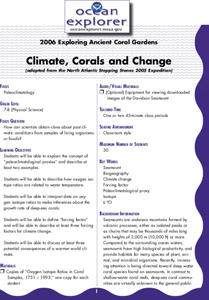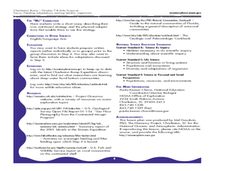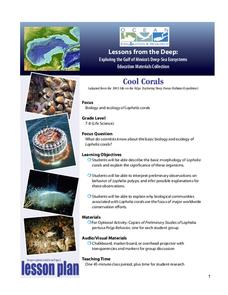Curated OER
Design a Reef!
Using a miniature coral reef aquarium kit, young ecologists model this unique ecosystem. They research various coral reef organisms and their niches, and they culminate the project by working together to write a report. Use this activity...
NOAA
Individual Species in the Deep Sea
A tube worm's outer covering is made of chitin, the same material that makes up the shells of lobsters and crabs. Scholars create tube worms and analyze and discuss the longevity of organisms living near cold seeps. They then discuss and...
Curated OER
Big Fleas Have Little Fleas
A benthic habitat hosts a vast collection of organisms and its structure influences the biodiversity. Middle-school marine biology explorers will discuss how corals impact structure, and therefore diversity, on the ocean floor. They draw...
NOAA
Climate, Corals and Change
Global warming isn't just an issue on land; deep ocean waters are also showing troubling signs. Young scientists learn more about deep water corals and the many recent discoveries researchers have made. Then they examine data related to...
Curated OER
Commonly Confused Words Exercise
Accept or except? Advice or advise? Eminent or imminent? Which is which witch? In order to select the correct word to complete 20 sentences, learners get out their dictionaries and check the meaning and usage of the commonly confused pairs.
Curated OER
Magellan and Coronado
The best part of elementary school is learning about the explorers. Take your 5th graders on a quick trip with European explorers Coronado and Magellan. Described here are their routes, personal histories, and encounters in the New...
Curated OER
Medical Explorer
After reading a case study, pupils will explore possible diagnoses, assessment, and treatment plans. Finding the definitions to medical vocabulary and sorting through patient history, they will begin to understand the process of...
NOAA
Deep-Sea Ecosystems – Life is Weird!
A pool of brine in the deep sea can be up to four times as salty as the surrounding sea water. The deep sea ecosystem relies on chemosynthesis and the organisms that live there are often strange to us. The lesson focuses on researching...
Houghton Mifflin Harcourt
Finding Subjects and Predicates
Diagramming sentences has never been easier. Four worksheets feature exercises on simple subject and predicates, complete subjects and predicates, as well as compound verbs. Kids indicate the parts of the sentences with circles and...
NOAA
Mapping the Deep-Ocean Floor
How do you create a map of the ocean floor without getting wet? Middle school oceanographers discover the process of bathymetric mapping in the third installment in a five-part series of lessons designed for seventh and eighth graders....
Montana State University
One Mountain, Many Cultures
Americans may think of Mount Everest as a region dedicated to adventurous hikers, but many cultures have flourished there! Learners read informative books, watch videos, participate in classroom discussion, analyze folk tales, and...
American Museum of Natural History
Field Trip Mars
Fly around the Martian surface. Pupils view a presentation on the planet Mars featuring a flyover that shows different views of the surface where rovers have landed and explored on different missions. As individuals watch the images, the...
Teachers.net
Columbus - Thanksgiving lesson plan
Students learn the history of Thanksgiving and Columbus Day, and they also create a "New World" mural in small groups.
Curated OER
I, Robot, Can Do That!
Assign groups of middle school oceanographers to research one of the following underwater robots; ABE, Herculues, ROPOS, RCV-150, Tiburon, or general purpose ROVs. An included handout guides them through information to be gathered. Each...
NOAA
Fishy Deep-sea Designs!
Oceans represent more than 80 percent of all habitats, yet we know less about them than most other habitats on the planet. The instructor introduces the epipelagic, mesopelagic, bathypelagic, twilight, and midnight zones in the ocean....
NOAA
A Matter of Density
Larvae transportation on the New England seamounts is based on the density of the water. Scholars calculate density and graph salinity versus temperature to better understand the distribution of organisms in a water column. Discussions...
Curated OER
How Am I Supposed to Eat THAT?
Students explain nutritional strategies of benthic organisms.They describe nutritional strategies of benthic organisms and describe these physical characteristics.
Bismarck Public Schools
Jefferson & the Louisiana Purchase
After learning about the Louisiana Purchase, assess your class members' understanding of Napoleon Bonaparte's involvement, states included in the purchase, and important key terms (i.e. neutrality, corps of discovery, etc.) associated...
Humanities Texas
Primary Source Worksheet: Thomas Jefferson, Confidential Message to Congress Concerning Western Exploration and Relations with the Indians
A confidential message written by Thomas Jefferson provides readers with an opportunity to practice their reading comprehension skills. The resource, part of a series, includes questions that require a close reading of the message and a...
NOAA
Deep-Sea Ecosystems – Cool Corals
Young oceanographers research deep sea corals that thrive on chemosynthesis. The lesson focuses on the biology of the animal, preferred habitat, associations, and interactions.
NOAA
Deep-Sea Ecosystems – Entering the Twilight Zone
Imagine an ecosystem without any light or oxygen, where living things convert carbon dioxide into food. This ecosystem is thriving and might just be the largest ecosystem on our planet, yet we know very little about it. The lesson...
NOAA
Where Have All the Glaciers Gone?
What happens when ice melts? Well ... water happens. When that melting ice is a glacier, the amount of water that results produces change throughout the world. Middle school science sleuths uncover the truth about global warming, the...
NOAA
A Day in the Life of an Ocean Explorer
What's life like aboard an ocean exploration vessel? Junior oceanographers examine the important role of communication in ocean research in lesson plan two of a five-part series from NOAA. The materials introduce the class to life on...
Cornell University
Vitamin C Module
Test the levels of vitamin C in different juices. After a lesson plan on the importance of vitamin C in our diets, learners use titration to determine the vitamin C content in juice. They use their experience with the titration to study...

























